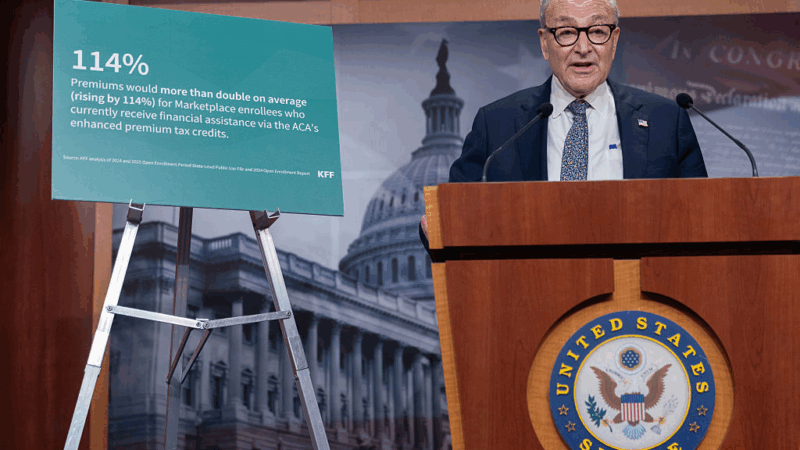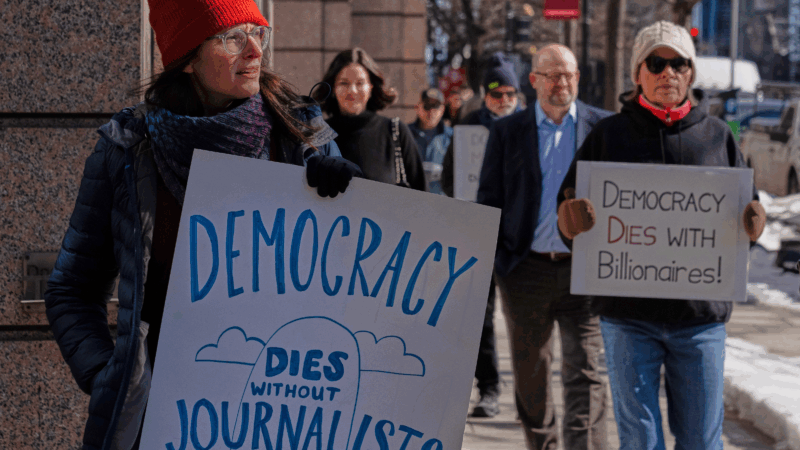What’s behind the health care fight that led to the government shutdown
A fight over health policy drove the current federal government shut down.
At issue is the cost of premiums for health care plans people buy on the Affordable Care Act, or Obamacare, marketplaces.
Enhanced tax credits for these premiums expire at the end of the year. Since 2021, those have kept ACA plans affordable for people who get their insurance this way.
Earlier this week, Democrats in the Senate refused to vote for the Republican short-term funding bill which did not include an extension of the enhanced premium tax credits.
So why do they matter?
The enhanced tax credits are important for people who don’t get health insurance through their job or a public program like Medicare or Medicaid. This year enrollment hit a record 24 million.
That is only about 7% of the U.S. population, but the people who rely on these plans are an influential group that includes small business owners, farmers and ranchers, says Cynthia Cox, vice president and director of the Program on the ACA at the nonpartisan health research organization KFF.
Cox and her team just did an analysis on what will happen to people’s premiums next year if Congress doesn’t extend the enhanced subsidies.
“On average, we’re expecting premium payments by enrollees to increase by 114%,” she says.
That means a lot of people are going to have to pay double the monthly premium they’re paying now.
Or, says Cox, they might have to switch to a higher deductible plan, change jobs to one that offers insurance, or they might lose their coverage.
The Congressional Budget office estimates that 4 million people will become uninsured if the enhanced tax credits expire.
It also estimates that extending the policy will cost the government a lot — $350 billion over 10 years.
Premium tax credits have been critical to increasing enrollment in ACA plans.
When the ACA was passed in 2010, Congress created a sliding scale to give people a break on their premiums based on income. But premiums were still too high for a lot of people and those with incomes above 400% of the federal poverty level had to pay full price, says Sabrina Corlette, project director at the Center on Health Insurance Reforms at Georgetown University.
“So there was a chunk of folks who just were really struggling to afford” their premiums, she says. And enrollment was sluggish.
So in 2021, Congress stepped in with a lot more federal funding, which made premiums more affordable for people of all income levels.
It was an “incredibly successful effort to get more people into coverage and reduce the uninsured rate,” says Corlette.
Some Republican lawmakers say the current enhanced tax credits are just too expensive. Other Republicans say they’re open to extending the policy but not as part of the shutdown fight.
“That premium support program doesn’t even expire until next year. So why are you shutting down the government on October 1 because of a program that doesn’t even expire for another few months?” Vice President JD Vance said on Fox News Wednesday.
Sen. Patty Murray, D-Wash., says actually, it is an urgent issue. As she explained in a press conference Wednesday, open enrollment for ACA plans starts Nov. 1.
“Later is too late,” she said. “The new higher health care rates, those are being set right now. Notifications to families — they’re in the mail now. Open enrollment is weeks away and families are panicking.”
For Cox, having this relatively small slice of the health insurance pie dominating the political universe takes her back to the repeal and replace fight of 2017 and countless standoffs over the Affordable Care Act since then.
“Obamacare has always been the center of a political firestorm, at least in health policy, she says. “Here we are again.”
For many U.S. Olympic athletes, Italy feels like home turf
Many spent their careers training on the mountains they'll be competing on at the Winter Games. Lindsey Vonn wanted to stage a comeback on these slopes and Jessie Diggins won her first World Cup there.
Immigrant whose skull was broken in 8 places during ICE arrest says beating was unprovoked
Alberto Castañeda Mondragón was hospitalized with eight skull fractures and five life-threatening brain hemorrhages. Officers claimed he ran into a wall, but medical staff doubted that account.
Pentagon says it’s cutting ties with ‘woke’ Harvard, ending military training
Amid an ongoing standoff between Harvard and the White House, the Defense Department said it plans to cut ties with the Ivy League — ending military training, fellowships and certificate programs.
‘Washington Post’ CEO resigns after going AWOL during massive job cuts
Washington Post chief executive and publisher Will Lewis has resigned just days after the newspaper announced massive layoffs.
In this Icelandic drama, a couple quietly drifts apart
Icelandic director Hlynur Pálmason weaves scenes of quiet domestic life against the backdrop of an arresting landscape in his newest film.
After the Fall: How Olympic figure skaters soar after stumbling on the ice
Olympic figure skating is often seems to take athletes to the very edge of perfection, but even the greatest stumble and fall. How do they pull themselves together again on the biggest world stage? Toughness, poise and practice.







